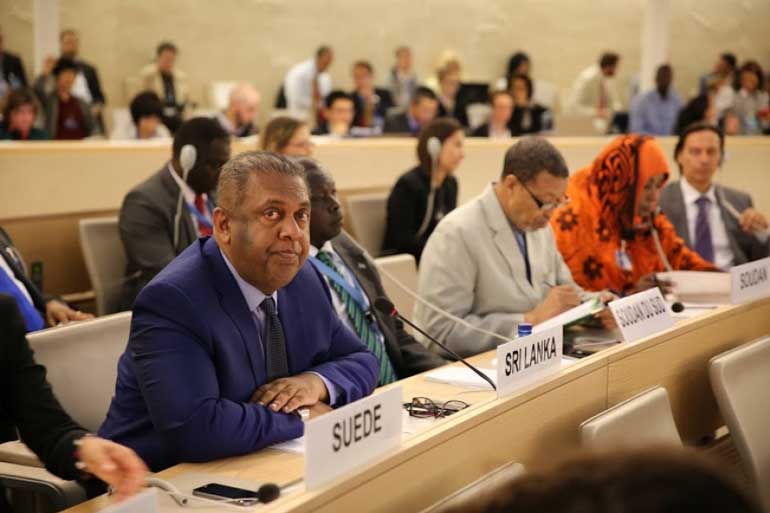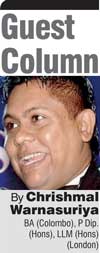Sunday Feb 15, 2026
Sunday Feb 15, 2026
Saturday, 26 September 2015 00:00 - - {{hitsCtrl.values.hits}}

Foreign Minister Mangala Samaraweera at the 30th Session of the UN Human Rights Council, Geneva
The Old Guard vs. the new – Variables and the constant
 So we are just over a month into the tenure of the new guard, this unique MS/RW alliance replacing (thankfully) the old MR regime, which, in my opinion fell, mainly due to its own inability to “manage” its corruption and nepotism; fully realising that these things can never be completely eradicated anywhere in the world, under any regime. All we had to do in the “common opposition” was to point them out to the People, they did the change!
So we are just over a month into the tenure of the new guard, this unique MS/RW alliance replacing (thankfully) the old MR regime, which, in my opinion fell, mainly due to its own inability to “manage” its corruption and nepotism; fully realising that these things can never be completely eradicated anywhere in the world, under any regime. All we had to do in the “common opposition” was to point them out to the People, they did the change!
Many things appear to be new, such as this fresh approach of a “united” parliament, possibly having learnt a lesson from the Rajapaksas not to be too selfish holding on to everything, the new lot is “sharing governance” (the cake big enough for everyone) so that everyone is kept happy. Thus we have the two larger parties sharing our Executive powers (ministries) under the term “National Government”; our Legislative powers are shared between them and the TNA pleased to be in Opposition leadership, whilst even our comrade-friends are appeased with the office of Chief Whip. One can but almost hear that old scout song emanating from the Diyawanna, “... the more we are together ... the merrier ... while your friends are my friends and my friends are your friends ... the merrier will be ...”; all is well and good and everyone is happy!
Now whilst many of these things appear to be new and fresh, or variable, some things appear to remain constant with any regime; such as this concept of “Geneva marketing”. You will hardly find a single workplace, social gathering, email inbox or even a wedding or funeral these days where some reference is not made to it - the news of the day. I too have been asked by at least two media stations to participate in this dialogue. However before we get too engrossed in this “Geneva syndrome” let us not be naive to believe all what we hear is “news”.
Of course sudden occurrences, as for instance the abduction and murder of poor little Seya is certainly so, but some of these “hot-topics” are dished out from time to time, very carefully spin-doctored by think-tanks for our consumption; supplemented by regular press releases, debates, etc. for us to chew on and digest whilst the selected few go on with their merry-governing! ‘Geneva’ has proven to be an effective marketing tool for politics, particularly over the last decade (talk of “electric chairs” by the MR camp, etc.) and is once again doing the news rounds even under the present one; of course with a fresh angle, we now appear to have elected our saviours from the wrath of the UN and the (Western) world!
So let us also take a closer look at these issues, commencing with our history of foreign affairs and its various phases to the present, with a focus on the UN and Geneva; to try and discern between fiction, myth and truth (if any) of the underlying stories. The subject area being fairly comprehensive (for a publisher), I will discuss it in several parts, so that each may be carried either singularly or as a series of connected articles.
Sri Lanka’s geo-political importance vis-à-vis our foreign policy
We can certainly pride ourselves for having been in the realm of international affairs for much of our sovereign status of over 2000 years. Sri Lanka’s introduction to Buddhism as a result of the friendship between the mighty Asoka of the Mauryan dynasty and our King Devanampiyatissa as far back as 3rd Century BC, through diplomatic channels, may be argued as our first example of foreign relations. It is also recorded that our emissaries were sent and received by many early civilisations of the world, including the mighty Augustus Caesar of Rome.
There are compelling reasons for this dominant presence (being a relatively small Island Nation) in the International fora. A primary factor is our geographical location which rendered it an almost inescapable stop in ancient trade routes, be it for Arabic seafarers from the West of ‘Serendib’ or for her East; with many recorded diversions from ‘silk route travellers’. Despite the world having become a global-village where a shopper in China may very well order a 16 ½ double-cuff shirt from Harrods of London online, the goods must still be physically delivered; and it is due to this economic and trade importance that we yet remain an important enough “reason” for most global players to show an interest in.
For the purposes of this dialogue let us consider our comparative history in two periods:
(a) Post independence (1948) to the end of Jayawardena era (1988) (b) Latter stages of Premadasa era (1991) through Kumaratunga (1994) to the end Rajapaksa (2014 – including end of the war and thereafter) to the present (MS/RW) era
A common factor to both periods is that the cornerstone in the formulation of our foreign policy has been our security concerns; in the former (a) worries over defending a newly formed nation from external aggression and in the latter (b) defending our unitary nature from the threat of secession, which appears to continue to date, despite the end of armed hostilities.
Historical foreign policy shifts with domestic politics
Historically a common factor to both these periods is the clearly identifiable shift of allegiances with global actors, depending on which party “ruled the roost” domestically and “Geneva” has been very much a local subject for politicians even then.
Period (a) –
As one of the first of Britain’s former colonies to become independent (after the 2nd world war) we were recognised as a Nation by the Commonwealth in 1948 itself; however the United Nations did not do so until 1955. A primary reason was that until 1956 consecutive UNP governments were reluctant to engage in diplomatic relations with any communist countries and the former Soviet Republic continued to exercise its veto in the Security Council against us, branding Ceylon a ‘puppet of Britain’; a sentiment echoed by even our own contemporary leftist parliamentarians who branded 1948 as a ‘fake independence’, criticising PM Senanayake’s government for being pro-Western, as Britain continued to “be responsible” for defining our foreign policy and safeguarding our external defence.
However the contrasting non-aligned foreign policy of the S.W.R.D. Bandaranaike government managed to balance the global power blocs, which easing of tensions continued even under the tenure of his wife, who, in fact went further with that concept of “positive neutrality” and accomplished much in foreign relations; the most notable being her involvement with the establishment of the Non Aligned Movement [NAM].
With the advent of the UNP government in 1977 Sri Lanka was to change dramatically. Jayawardene was a dynamic leader and a statesman and what the Bandaranaikes achieved at external affairs, he equalled internally with massive development projects and an unparalleled economic boom; of course, tilting us towards the richer capitalist West in our foreign relations mostly to obtain funding for his economic plans, even earning himself the pseudonym ‘Yankee Dickey’. A separate Minister was placed in charge of foreign affairs, a portfolio that had continuously been held by the Head of State till then which was to our strategic advantage, as Minister (late) A.C.S. Hameed managed to woo a new partner; opening the oil rich Middle Eastern Asian nations both as investors and its market.
Period (b) –
I have purposely begun this period with the latter stages of the Premadasa presidency, as there was hardly any room for employing strategic foreign diplomacy as he began; most actions were forced upon him by a rapidly escalating domestic situation, with an external force (IPKF) physically present on our soil, compounded by a Southern militancy growing in the form of the JVP. We will discuss more of this era when we look closely at “the Indian Factor”, which, because of its significant importance in our foreign policy, we will address separately.
However there appears to be no “Geneva phobia” (nor any such concern for that matter) from his actions as in the case of previous UNP governments; he was openly hostile with India criticising the Peace Accord, issuing an ultimatum to withdraw all IPKF troops, banished a UK High Commissioner (Gladstone) declaring him persona non grata; all at first sight appearing to cause diplomatic furores. However the contrary has been argued, that despite the common perception that Sri Lanka being a small country must not tread on too many toes, Premadasa’s wish for the world to ‘sit up and notice us’ gained a form of ‘grudging respect’. This is very much akin to the policy that was adopted by the MR regime, both during and after the end of hostilities, not caring too much for Geneva or the entire West for that matter, seeking to align themselves more with China or other smaller nations. Contrastingly they “marketed” Geneva exceptionally well, as a means of retaining political power of the majority Sinhalese.
The intervening Kumaratunga era however was once again a contrast to the above two, as she placed much emphasis on foreign diplomacy, deploying persons of the calibre of the charismatic (late) Kadirgamar to take on Geneva; thus playing the traditional “balancing role” synonymous with her parents.
With these clearly identifiable shifts in the foreign policies of UNP and SLFP led governments in history, an interesting discussion awaits us to analyse the diplomatic behaviour of this unique MS/RW coalition, which on their own admission is a mixture of both. In that dialogue to follow we will look closely at some of the following:
As we await this dialogue to follow, let me wish my fellow Sri Lankans, as our friends in China do (no pun intended); “may we live in interesting times”!